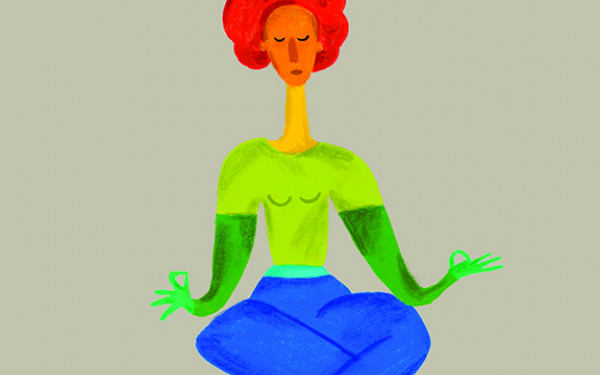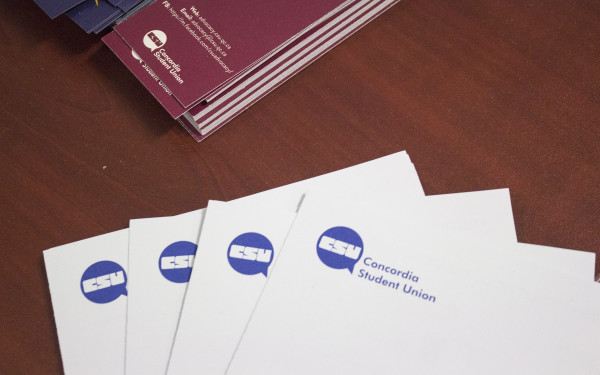Campus security: New name, same worries
Is Concordia’s security rebranding enough to win BIPOC students’ trust?
The identity of Sam was concealed for their safety.
Just over a year after Concordia’s security team rebranded to Campus Safety and Prevention Services (CSPS), BIPOC students continue to express a sentiment of discomfort and distrust towards the university’s security staff.
CSPS’s attempts at improving the relationship between agents and students have included the name change and the introduction of Newton the therapy dog last semester.
Vannina Maestracci, a spokesperson for Concordia, describes Newton’s role as “part of efforts by the CSPS to improve outreach to students, foster dialogue and be seen as a resource.”
However, Sam, a Black Concordia student who spoke with The Link, recounted an instance specifically with the dog’s handler in which they felt unsettled.
The interaction took place in November 2023, shortly after the Nov. 8 altercation in which tensions rose between Israeli and Palestinian student groups inside the Hall building on the Sir George Williams campus.
Amid a period of heightened security activity and increasing activism in support of Palestine, Sam says they were approached by a member of CSPS who asked them if they attended Concordia and if they could identify themselves. At that moment, they immediately obliged and showed the agent their student ID, but it was the agent’s following sentence that took them by surprise.
“As he is looking at my ID, he starts to say ‘Yeah sorry, it’s because you look like a suspect,’ and that’s when I first had the initial shock because I had such a different impression of what the situation was,” Sam said.
Spearheaded during the height of the Black Lives Matter movement, a widespread exploration of approaches in policing—and the importance of de-escalation and racial neutrality—spread to the forefront of discussions on the role of security agents on university campuses in recent years.
Reflecting the university’s move towards addressing systemic racism, Maestracci stated that the security’s name change was “in line with the recommendations of the Task Force on Anti-Black Racism,” which began its consultation activities after the murders of George Floyd, Breonna Taylor and Ahmaud Arbery.
Despite Concordia’s attempts to foster a sense of community through the security team’s rebranding, past incidents with BIPOC community members and students continue to permeate the team's connection to the university’s minority population.
Most notably in 2017, the Montreal Gazette reported that the Quebec Human Rights Commission recommended Concordia and the security firm pay $33,000 “to a woman who alleges she was expelled from the campus because she is Black and campus security guards assumed she was homeless.”
In 2023, The Link reported on racial profiling incidents at the Grey Nuns Residence where a security guard allegedly harassed Black residents on multiple occasions.
Sam highlighted how race was a factor at play during their interaction with the CSPS agent. “As a Black person, wearing my keffiyeh, and knowing the context that I had in mind, my first thought was ‘I’ve never seen this kind of stuff happen to any other white person—I’ve never even seen anyone have this kind of experience.’”
After the CSPS agent revealed to them that they resembled a suspect, Sam said the agent then wrote down their name and left. They added that they were not provided details later on about the investigation the agent was seemingly conducting, until they filed an official complaint through the CSPS website.
“I just wish I knew the context of the situation because it felt very similar to a police-like situation—and normally with the police, you know your rights. You know what you have to and don’t have to divulge. But with a security guard, it’s not very clarified,” they said.
Reflecting on the event, Sam admitted to having put up stickers on poster boards and on bathroom walls, which provided information on how students can contact local Members of Parliament in protest of the Israeli occupation in Gaza.
With that, they questioned the validity of what the CSPS considers a crime, and whether their actions were any different from the numerous other students who have stuck posters and signs throughout the campus before them.
“People put things up all the time, but it’s only since the recent aggression in Palestine that different stickers are being removed from the school’s walls. I feel like it’s kind of odd that sometimes rules are not upheld, and at other times agents are super driven to finding ‘the culprit,’” they said.
Despite the negative sentiment that reverberated from Sam’s interaction with the CSPS agent, “I don’t think that the Concordia security guards are inherently bad,” they said. “I just think there is too much of a resemblance starting to appear between them and the police, and I feel like that’s the issue that makes us feel unsafe,” they added.
Sam’s hesitation towards CSPS, however, is not an individual concern. Sabrina Baba, a Black third-year political science student, reiterated Sam’s sentiments, describing her impression of CSPS agents as cold and intimidating.
“I don’t feel like they are approachable. I feel like their approach is very impersonal,” Baba said.
When asked about the potential for the security team’s relationship to students, Maestracci described an openness to progress. “CSPS is always looking to improve its relationship with the entire community to provide a safe campus for everyone,” she said.
While acknowledging CSPS’ ongoing effort to bridge the gap between students and agents, Baba also noted there is still progress to be made to help foster a more pleasant relationship between the two.
“Maybe if they try to be more community-based, and try to interact with students a little bit more, it could make us feel more safe in approaching them when we do have issues or concerns to raise,” Baba suggested.
“The police outside doesn’t help me,” Sam added, “and I’d like to feel like there is someone on my side at school. I don’t want to fight against them.”
This article originally appeared in Volume 44, Issue 9, published January 30, 2024.







_600_375_90_s_c1.jpg)